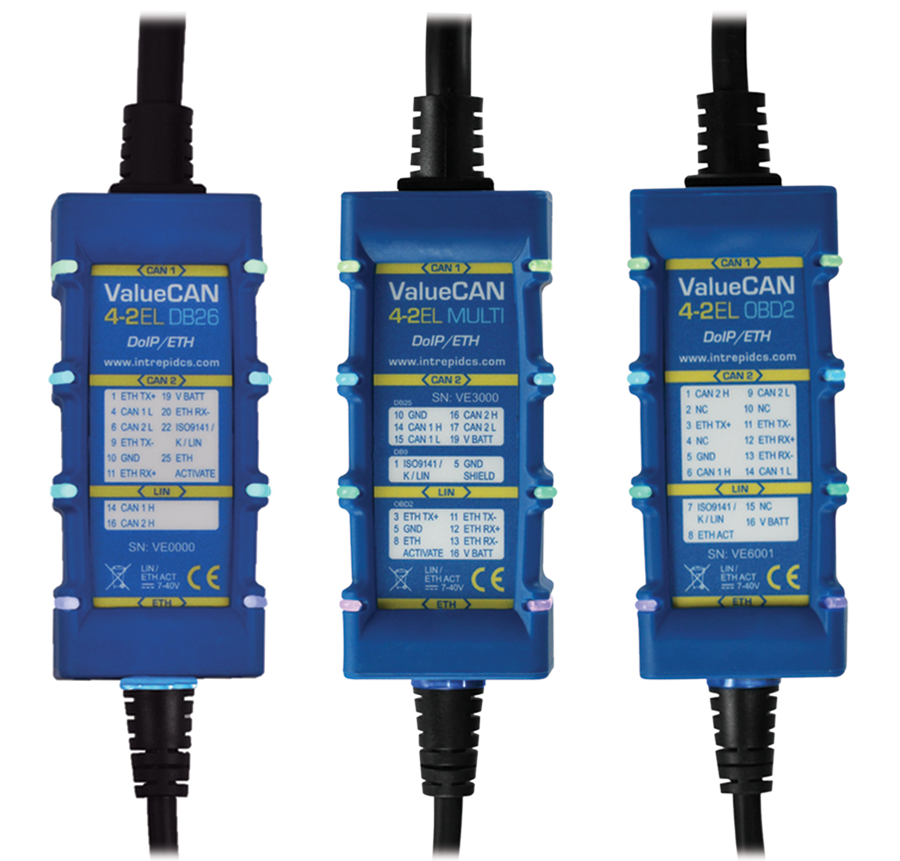DoIP 표준 - CAN FD 단일 케이블 인터페이스
|
Superior Engineering The ValueCAN 4-2EL is part of the ValueCAN 4 series, a family of high-quality tools for CAN FD and CAN 2.0. ValueCAN 4-2EL builds on the success of field-tested ValueCAN 3, with additional advancements like software-controlled CAN termination, lower USB latency, cybersecurity support, standalone operation via 5V USB power supply. The ValueCAN 4-2EL is fully isolated from the PC. The isolation feature, which is not common on low cost interfaces, resolves issues with grounding or noise affecting the PC. The ValueCAN 4-2EL is electrically hardened to survive abusive environments, including reverse battery and electrical transients. ValueCAN 4-2EL has a strong aluminum case with rubber boot and surround LEDs indicating status of the device and its networks. The LED configuration can also be customized. ValueCAN 4-2EL’s integrated cable design makes it an easy to carry tool with no parts to misplace. The device pinout is printed on the housing to make wiring easy. ValueCAN 4-2EL is backed by a one-year warranty. |
High Performance
The ValueCAN 4-2EL has been tested and verified to support two high-bandwidth CAN FD networks, 1 LIN and 1 Ethernet. This includes 100% utilization at 8 Mb/s data rates on both CAN FD channels.
DoIP Standard
The ValueCAN 4-2EL is the ultimate DoIP standard. The activation line is included on the connector. When combined with Vehicle Spy 3 Exe version, the ValueCAN 4-2EL is a great deal for DoIP. Further more, the ValueCAN 4-2EL supports the Intrepid DLL API, J2534 API, or RP1210 API enabling users to create their own applications.
High-Level Protocol Support
The ValueCAN 4-2EL is compatible with J1939, OBD2 on CAN, Keyword Protocol over CAN, UDS diagnostics, CCP/XCP, DeviceNet and CANOpen. Cables are available for J1939 and diagnostics on CAN. Hardware-implemented ISO15765 allows super fast CAN FD ECU flashing.
Turn-Key Software Support
The ValueCAN 4-2EL can be used with Vehicle Spy software, a powerful vehicle bus analyzer for monitoring messages and configuring baud rates. Vehicle Spy’s other features include filtering traffic, decoding message data, building scripts, simulating nodes, creating GUIs to control, log and view data, and building graphical displays of data. Real Time Acceleration and Standalone Mode enable High Speed Flashing, Gateway, and ECU simulation.
Standalone Capability
The ValueCAN 4-2EL can load real-time Function Block scripts and C code created with Vehicle Spy Professional, which execute in real time at microsecond resolution. Scripts can be controlled and monitored with a PC or operate standalone.
Intrepid Security Module (ISM) for Cybersecurity
ISM runs an embedded code with the support of Coremini Standalone mode feature. ISM can be used for encryption and authentication of vehicle network data as part of the cybersecurity. Among other use cases, ISM can support real-time processing of vehicle network data and CCP secure access.
CAN Bus Termination Test
The ValueCAN 4-2EL can be used with Vehicle Spy to check the termination of an attached CAN network. This is done by generating a CAN error frame and measuring how much time the bus takes to recover from the error (with microsecond-level resolution).
Software Support: Create Your Application Using the Included Intrepid DLL API, J2534 API, or RP1210 API
For those who wish to write their own applications, ValueCAN 4 includes a DLL and helpful examples for Python, Visual C++, C++ Builder, LabWindows CVI, LabVIEW, Java, MATLAB, Delphi, Excel, and Visual Basic. For more information on the DLL, please see the neoVI DLL documentation (ValueCAN 4 uses the neoVI DLL).
The ValueCAN 4-2EL has been tested and verified to support two high-bandwidth CAN FD networks, 1 LIN and 1 Ethernet. This includes 100% utilization at 8 Mb/s data rates on both CAN FD channels.
DoIP Standard
The ValueCAN 4-2EL is the ultimate DoIP standard. The activation line is included on the connector. When combined with Vehicle Spy 3 Exe version, the ValueCAN 4-2EL is a great deal for DoIP. Further more, the ValueCAN 4-2EL supports the Intrepid DLL API, J2534 API, or RP1210 API enabling users to create their own applications.
High-Level Protocol Support
The ValueCAN 4-2EL is compatible with J1939, OBD2 on CAN, Keyword Protocol over CAN, UDS diagnostics, CCP/XCP, DeviceNet and CANOpen. Cables are available for J1939 and diagnostics on CAN. Hardware-implemented ISO15765 allows super fast CAN FD ECU flashing.
Turn-Key Software Support
The ValueCAN 4-2EL can be used with Vehicle Spy software, a powerful vehicle bus analyzer for monitoring messages and configuring baud rates. Vehicle Spy’s other features include filtering traffic, decoding message data, building scripts, simulating nodes, creating GUIs to control, log and view data, and building graphical displays of data. Real Time Acceleration and Standalone Mode enable High Speed Flashing, Gateway, and ECU simulation.
Standalone Capability
The ValueCAN 4-2EL can load real-time Function Block scripts and C code created with Vehicle Spy Professional, which execute in real time at microsecond resolution. Scripts can be controlled and monitored with a PC or operate standalone.
Intrepid Security Module (ISM) for Cybersecurity
ISM runs an embedded code with the support of Coremini Standalone mode feature. ISM can be used for encryption and authentication of vehicle network data as part of the cybersecurity. Among other use cases, ISM can support real-time processing of vehicle network data and CCP secure access.
CAN Bus Termination Test
The ValueCAN 4-2EL can be used with Vehicle Spy to check the termination of an attached CAN network. This is done by generating a CAN error frame and measuring how much time the bus takes to recover from the error (with microsecond-level resolution).
Software Support: Create Your Application Using the Included Intrepid DLL API, J2534 API, or RP1210 API
For those who wish to write their own applications, ValueCAN 4 includes a DLL and helpful examples for Python, Visual C++, C++ Builder, LabWindows CVI, LabVIEW, Java, MATLAB, Delphi, Excel, and Visual Basic. For more information on the DLL, please see the neoVI DLL documentation (ValueCAN 4 uses the neoVI DLL).

